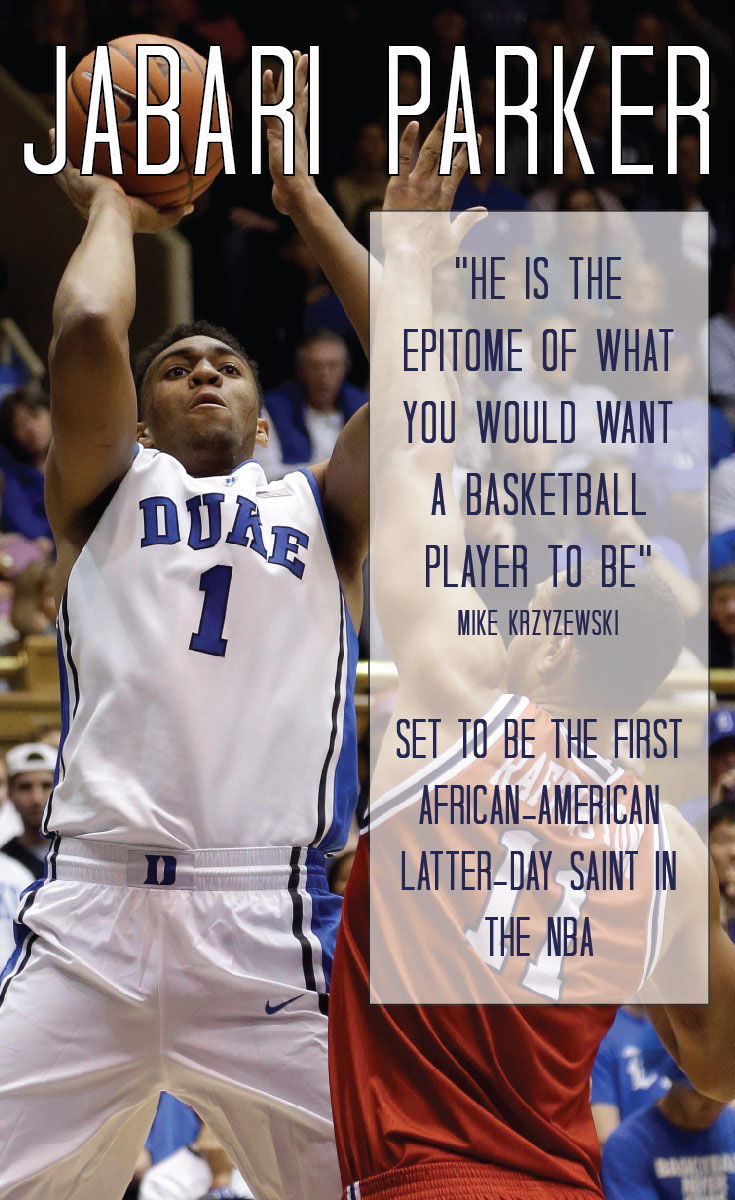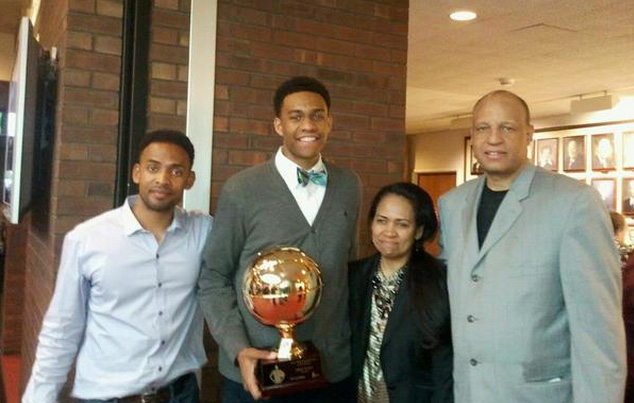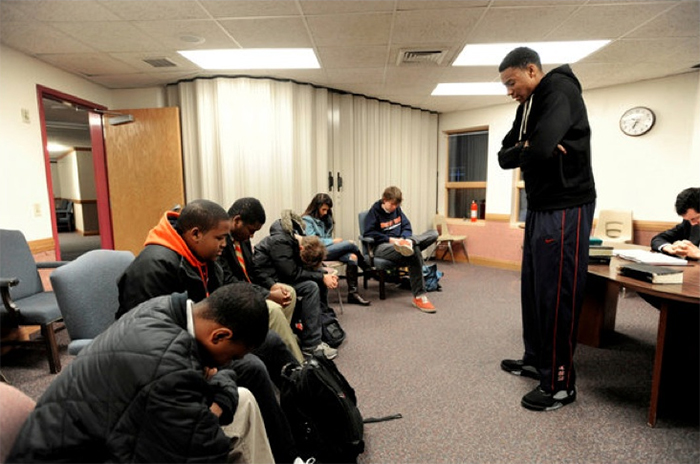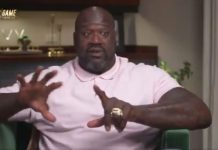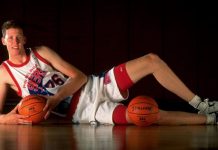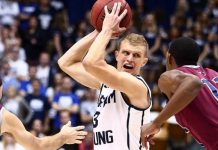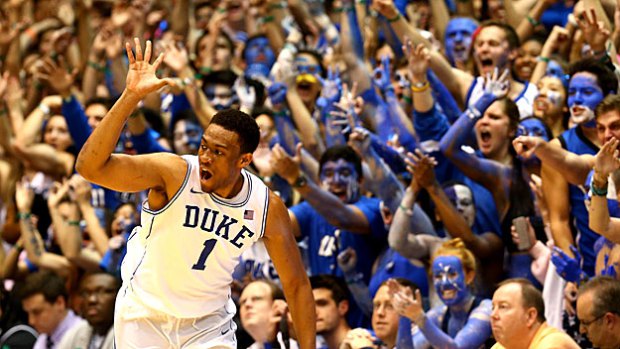
During his junior year at Simeon Career Academy, born-and-raised Latter-day Saint and Chicago, Illinois native Jabari Parker was already earning comparisons, on a national level, to New York Knicks star power forward Carmelo Anthony.
That, added to the fact that he’s the son of NBA legend Sonny Parker, had sports analysts around the country casting omens about “unrealistically high expectations,” and all the attention “going to his head.”
Since then, the now-19-year-old 2014 NBA draft prospect has shown that overwhelming national recognition and strong moral character are not as mutually exclusive as they sometimes seem—though Parker’s road to the NBA was not without both emotional and physical obstacles.
“You were Sonny Parker’s son,” said Parker’s brother, Chris Parker, of the public pressure of growing up in their father’s long shadow. “So Jabari never became Jabari until probably seventh or eighth grade. Me and him were always called ‘Little Sonny.’”
Finding Faith in the Urban Jungle
The local ward building of The Church of Jesus Christ of Latter-day Saints, of which their immediate family are members, became both a training ground and a fortress of solitude for the young Jabari Parker.
Parker’s family said the neighborhood, to put things lightly, was a rough one.
“There’s gang violence going on. There are shootings going on. There’s all kinds of stuff,” said Parker’s mother, Lola Parker. “You know what—it makes you a little tougher. But also, it makes you grateful at the same time.”
Though gratitude is an emotion few might associate with the modern inner- city, Jabari Parker himself insists he’s a product of his environment.
“Even though there’s a lot of violence, and a lot of adversity, everybody [in the community] is still together,” said Parker. “It’s positive. I think the news doesn’t get a chance to see that people thrive in an environment of adversity.”
Parker’s faith, and his regular attendance at daily seminary meetings offered locally for high-school-age Mormons, helped form a foundation for his growth despite—and perhaps mostly because of—Chicago’s jungle of urban adversity.
In Holy Places
Just because the Parker family felt comfortable in their home didn’t mean the streets were a safe place to play ball.
“Growing up playing outdoors, our parents were always really protective of the places that we’d go and some of the decisions that we’d make,” said Chris Parker. “The church [building] was literally a place where, if they found out we were there, we couldn’t get in trouble.”
As some of the only practicing Latter-day Saint youth in the area, Chris and Jabari had a set of keys to the local chapel, which had a small basketball court in what members of the church call the “cultural hall.”
“As far as the amount of youth in our church, it was just really us,” said Chris Parker. “Having the gym at the church, it was like easy access all the time. There was nowhere else we really wanted to be.”
The early struggle of finding and creating a spiritually and physically safe environment out of the apparent chaos of the city streets prepared Parker for the greatest adversity he faced as an athlete.
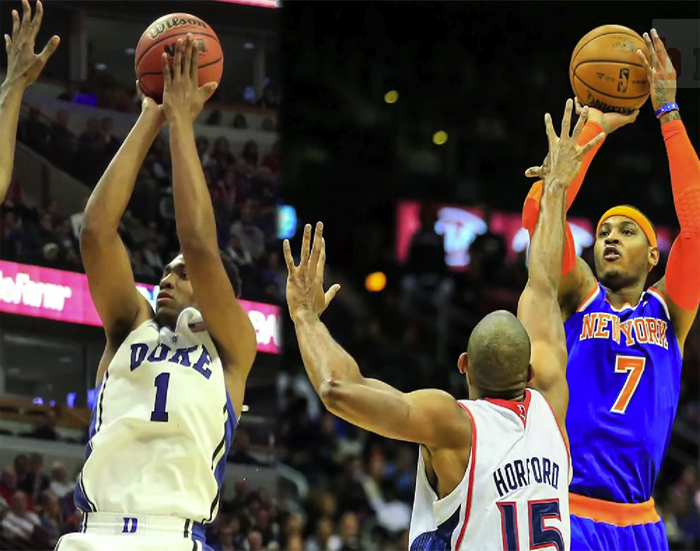
Getting Back to the Basics
In the middle of his high school playing career, then-16-year-old Parker suffered a devastating foot injury that took him off of his feet—and more importantly, off the court—for six months.
“It was very difficult, very depressing for him,” said Sonny Parker. “Going through that, not getting to play for the first time in his life—it was hard for him. I talked to him a lot.”
Sonny Parker told his son that his body was just like a bicycle—that the things he’d learned to do, he’d be able to do again if he worked hard at it.
“When I got back to running, I didn’t take baby steps. I didn’t crawl,” Jabari Parker said. “Right away, I just started running.”
Parker’s parents said they struggled to help their son deal with the frustration of being physically unfit to play, but in the end it was Jabari’s own work ethic that propelled him back into full form.
“He’d be outside running, at 11 or 12 o’clock at night while we were sleeping, in the dark and the freezing cold, just to get back,” said Sonny Parker. “I told him, ‘Jabari, do your training and your conditioning,’ and he did that.”
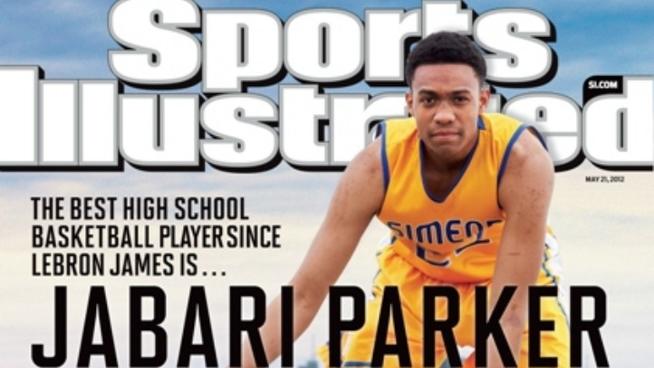
“The Best High School Basketball Player since LeBron James”
When Parker returned to the court in 2011, he led his team to its third straight state title. He was voted MVP of the championship tournament.
Later that same year, as a member of the United States National Basketball Team, Parker helped the U.S. go a combined 13-0 record in international play. He averaged 25 points and 10 rebounds per 40 minutes of play against the best his age group had to offer across the globe.
Parker was later voted USA Basketball Male Athlete of the Year and 2011 FIBA Americas U16 Championship MVP. Parker clocked in at 6’9”, 225 (the beginnings of LeBron James-esque height and strength) as a High School senior.
Even before his size became a factor, Parker’s natural athletic skill made him a target for Division I universities—his first D-I scholarship offer came at the end of the sixth grade.
Playing College basketball seemed destined for Jabari Parker, but the where of it wasn’t decided until after years of careful research—and, yes, personal and family prayer.
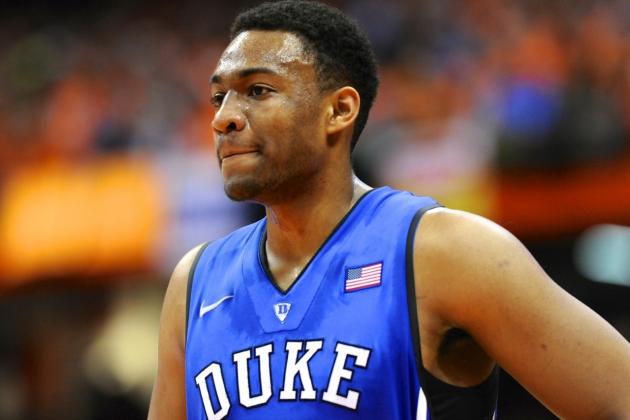
One Mormon and a few Blue Devils
As ESPN’s number two high school prospect in the nation, and coming off a fourth straight state title with Simeon, Parker committed to play for Duke University. The logic behind that decision may not have had as much to do with basketball as some pundits might say.
“As a parent, you want your kids to go to these prestigious universities,” said Lola Parker, who—like most Latter-day Saint mothers—valued her son’s education above any celebrity status he might attain. “Because it’s not all about basketball, and there is life after basketball.”
If Parker himself knew there was life after basketball, he certainly didn’t play like it. From an astounding 22-point debut college performance through to the 2014 NCAA championship tournament, he was Duke’s highest-scoring freshman of all time.
For a team with a long and storied basketball legacy that includes 15 trips to the Final Four and four national titles—and an alumni roster that includes names like Grant Hill and Danny Boozer—and while playing as a freshman in one of the toughest conferences in college hoops, Parker averaged 19.1 points per game.
He set a Duke school record for most points scored through a player’s first two college games, with 49. He led the Atlantic Sun Conference as a freshman with 105 offensive rebounds.
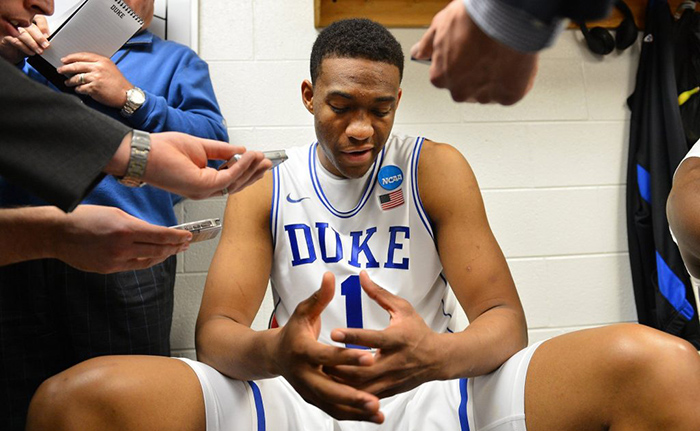
A Disappointing End
Helped along partly by Parker’s growing skill and chemistry with his teammates—as well as incredible offensive depth beside him—Duke earned the number three seed going into the NCAA tournament in March.
Expectations were high. The Blue Devils set out to make a deep run, and all the experts said it was more a matter of how than if.
But the string of shocking upsets that defined the opening round of the 2014 tournament continued when Duke faced off against 14-seed Mercer, an 8,300-student school from Macon, GA.
The Devils were eliminated in a heartbreaking 87-81 loss. In a piece Parker, himself, wrote for Sports Illustrated, he described how he felt about his play.
“I was incredibly disappointed and blamed myself,” Parker wrote. “I didn’t watch basketball or go to the gym for several days.”
Parker admitted that losing in such a disappointing fashion may have delayed his decision to immediately do as his teammates and most sports analysts expected—declare for the NBA draft. Another season in college meant a shot at redemption—an obsession that sprang, perhaps, from his deep-rooted faith in and knowledge of the gospel.
“I soon realized the real test is how we handle defeat,” Parker wrote, “and I laced my shoes up and headed to the student rec center to play some pick-up. It reminded me of how much I loved the game, but it was only a temporary reprieve.”

The Decision
Despite how accurate Parker made the ‘Melo power forward analogy during his year on an NCAA court (and Parker is “more well-rounded” and doesn’t exhibit “any of the negative selfishness or lack of team focus” of Anthony according to pro scout Jorrye Nixon), it wasn’t until April 2014 that the 19-year-old prospect finally decided against the 2 year missionary service usually expected of Latter-day Saints his age.
In fact, he waited until just a week before the April 27 deadline to make his final decision. Up until a week before his final decision, Parker seemed to be leaning toward staying on another year at Duke.
Parker isn’t the first Mormon to forgo missionary service in favor of the opportunity to let his actions do the preaching in the public eye. The Boston Celtics’ Danny Ainge and acclaimed singer Donny Osmond are just two prominent names on that list. Regarding his decision, Parker wrote:
After talking with my family, my local church leaders and a couple close friends I’m at peace with my decision to forego a mission for now and join the NBA. I don’t consider myself an exception to the rule. At this point in my life I know this is the right decision.
The draft decision obviously wasn’t about money, either.
“My parents, they come from different backgrounds. They don’t even value money,” Parker told ESPN radio in early April. “My situation isn’t the best, but they’re not complaining and I’ve been going on this long, so why can’t I wait another year?
“That’s the mindset in my head that keeps me moving…It’s a very tough decision, especially potentially leaving behind my coach and the program that really helped me out this year, so I really have to keep them in consideration in this whole process.”
Only after a closed-doors meeting with Duke head coach Mike Krzyzewski did Parker’s “mindset” seem to shift. Krzyzewski’s high opinion of Parker, and the way the young Latter-day Saint comported himself both at school and on the court, is made evident by the praise his coach heaped upon him.
“Jabari could not have been better. He is the epitome of what you would want a basketball player to be – outstanding everyday on the practice court and in the classroom and a very humble young man,” Krzyzewski said later in a press release, according to sportsillustrated.com. “It was an honor for us to have him in our program, and he will always be a part of our family here at Duke.
“We will be on the Jabari Parker team the rest of our lives.”
From the effect of his play on teammates to the influence he’s had in the locker room, it’s evident Parker boasts an impressive resume both on and off the court.
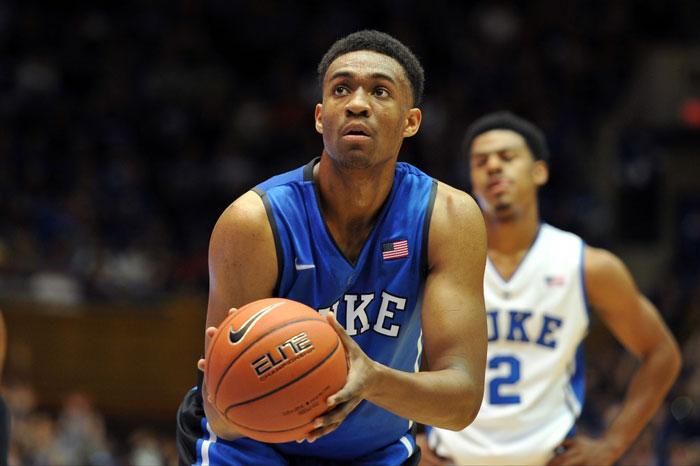
Jabari Parker—Draft Prospect Strength Assessment
Strengths
Parker’s offensive skillset and game style, after a year of development in the NCAA, have put him on a level that scouts have called “remarkable,” “explosive,” and “passionate.” He possesses an understanding of the game that is “incredibly advanced for his age,” according to Sports Illustrated’s draft rankings.
Professional scout Drew Wolin made this assessment on www.nbadraft.net:
“[Parker’s] work ethic is phenomenal. [He] really wants to be a leader; [he] wants to be great … Even in high school, [he] practiced with the focus of a pro.
“[Parker] Can create for teammates thanks to his high basketball IQ and overall play making ability. [He] commands so much attention from opposing defenses that teammates will find themselves with more opportunities to receive the ball in a position to score with him on the floor.”
Parker’s hard work has turned him into a proven winner—he celebrated 4 straight state championships during his high school ball days, and won two gold medals—and when it comes to intangibles, like mental stamina and commitment, the young forward has enough to spare.
Nixon added his own praise of Parker’s “NBA-ready step-back [jump shot],” and aptitude for a physical style of play near the net:
“[Parker] looks like he has the necessary tools to develop into a primary scorer at the next level, and the mentality to handle that responsibility. [He] has some natural shot-making ability that all of the high level NBA scorers possess, and has shown he can really light up the scoreboard in bunches.”
In other words, Jabari Parker is a rare breed of athlete, desperately sought after by professional franchises, that not only excels at getting results on the court but makes his teammates better simply by being there.
He is, potentially, the sort of player that could anchor a dynasty.
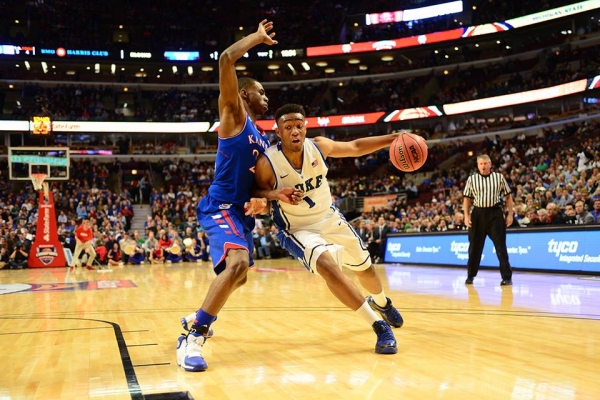
Weaknesses
Most pro scouts agree that if Parker is going to be successful in the big time, his biggest obstacle will be on the defensive half of the court.
The unique challenge presented by the unmatched speed and ball control of pro opponents could prompt the development of notably lacking defensive smarts to complement his incredible offensive ingenuity—or it could be a perpetual chink in his armor.
NBA scouts agree almost unanimously that his effort and attentiveness decline substantially when his opponent possesses the ball. Parker seems to be caught in a “tweener” stage of development, where he’s not quite quick enough to track the long game of opposing point guards, but also lacks the reach to defend down low in the post.
The Consensus: Parker’s size, offensive I.Q., leadership skills and playmaking ability put him with elite company, and his persistent work ethic should ease any fears potential NBA managers have over his sub-standard defensive game.
He is a “coach’s dream,” in that he seems to possess the rare combination of elite skill and coachability. According to Chris Mannix of Sports Illustrated, he’s “arguably the most NBA-ready player in the draft.”
Parker is widely considered a virtual lock to be selected top-three in the draft June 26, and it’s a strong possibility that he’ll become the first Mormon ever to be drafted number one overall.
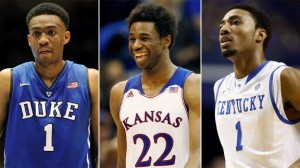
Oh, the Possibilities.
Of the handful of players available and expected to be drafted in the first round, there is a foursome that has separated itself from the rest of the field.
Parker is joined by Kansas stars Andrew Wiggins and Joel Embiid, and Australian point/shooting guard Dante Exum.
The Cleveland Cavaliers have first pick, followed by the Milwaukee Bucks, Philadelphia 76ers, and Orlando Magic.
The Utah Jazz will pick fifth.
If the Cavs use their top pick on Parker, he will be the highest-drafted Latter-day Saint and the only Mormon to be drafted first overall in any professional sport.
Shawn Bradley, currently the highest Mormon professional draft pick, was selected second overall in the 1993 NBA draft.
While it’s a distant possibility that the top four teams could inexplicably pass on Parker’s size and skill for the admittedly impressive range of other options available, Parker is predicted in most “mock draft” scenarios to go first or second.
The Cavs need the strong offensive presence and size that both Parker and Embiid can provide—Embiid is a natural center and Parker is comfortable in either forward position—but opinions differ on the value of the intangibles each will bring to the team.
Another variable is Embiid’s recent injury—a stress fracture in his right foot that will require surgery. That, combined with a back problem that prompted an early end to his season with Kansas, is enough to make some GMs balk at the idea of risking a valuable first-round pick.
If Cleveland decides in favor of Embiid’s height and reach inside the key, then the Bucks are expected to go with Parker. But Wiggins, the top prospect at small forward, is also a legitimate option.
In all the mock drafts run by major sports blogs and news sources, only once was Parker drafted as low as third.
Other teams outside the top four, including the Utah Jazz, at number five, are trying to trade into the top of the draft in order for the opportunity to select Parker.
All the speculation will end June 26 and regardless of where he lands, Parker will have the opportunity to begin his NBA dream.
Plenty of questions remain in regards to Jabari Parker’s future, however. How well will he do in the NBA? Will he become the first Latter-day Saint chosen number one in the draft? How will his faith continue to impact his career? Add your opinion to the discussion in comments below.
